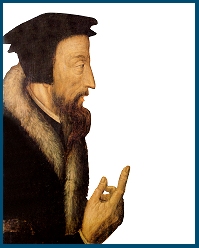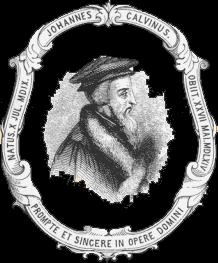 |
Johannes Calvinus / John Calvin / Jean CauvinFrench Reformer and Theologian(1509-1564) |
Pauline Letters:
Orig.: Commentarii in quatuor Pauli Epistolas (Genevae : per Ioannem Girardum, 1548).
Text: Commentarius in Epistolam ad Galatas (Corpus Reformatorum 78; Brunswick: Schwetschke, 1893).
Also: Commentarii in Pauli Epistolas ad Galatas, ad Ephesios, ad Philippenses, ad Colossenses (Ioannis Calvini Opera omnia. Series 2, Opera exegetica Veteris et Novi Testamenti; 16; ed. H. Feld; Geneva: Droz, 1992
ET: The Epistle of Paul the Apostle to the Galatians, Trans. T. H. L. Parker. Grand Rapids: Eerdmans, 1965, and later reprints). [Earlier ET by W. Pringle; Calvin Trans. Soc., 1854].
John Calvin, Sermons on Galatians (ET [from French]
K. Childress; Edinburgh: Banner of Truth Trust, 1997).

-
An edition of the Latin works of Calvin is available under the title Calvini Opera quce supersunt omnia, 5 vols. (Brunswick, 1864-1867).
-
Commentarii in libros NT are edited by Tholuck (Halle, 1833-38, 7 vols.); one of the Comm. in Psalmos (1836, 2 vols.), and of the Institutiones Religionis Christiance was also edited by Tholuck (Halle, 1834, 1835, 2 vols.); one of the Comm. in lib. Geneseos (1838) by Hengstenberg.
Secondary Literature
-
Evans, Gillian R. The Language and Logic of the Bible: The Road to the Reformation. Cambridge: Cambridge University Press, 1985.
-
Millet, Olivier. Calvin et la dynamic de la parole. Geneva: Editions Slatkine, 1992.
-
Muller, Richard A. and John Thompson, “The Significance of Precritical Exegesis,” In Biblical Interpretation in the Era of the Reformation. Ed. Richard A. Muller, John Thompson. Grand Rapids, MI: Eerdmans, 1996, 335-42.
-
Parker, T. H. L. Calvin’s New Testament Commentaries. London: SCM, 1971.
-
Torannce, Thomas F. The Hermeneutics of John Calvin. Edinburgh: Scottish Academic Press, 1988.
-
Zachman, Randall C. “ ‘Do you understand what you are reading?’ Calvin’s guidance for the reading of Scripture,” Scottish Journal of Theology 59/1 (2001) 1-20.
-
Zachman, Randall C. “Gathering meaning from the context: Calvin’s exegetical method,” Journal of Religion 82 (2002).
-
Born July 10, 1509, at Noyon in northern France.
-
1518, Calvin's mother died, and John was taken into very powerful d’Hangest household
-
521, sent to Paris for school at Colleges de la Marche and Montaigu.
-
1526, abruptly sent by his father to study law at Orleans; became friends with Protestant Reformers, Pierre Robert and Melchior Wolmar.
-
1529, followed Wolmar to Bourges law school, possibly already converted to Reform.
-
1531, Calvin's father died in disgrace in Noyon over missing funds; John received law degree
-
1532: Calvin's first published work is a commentary on Seneca, De Clementia.
-
1533, while in Paris he helped Nicolas Cop draft a speech sympathetic to Reform, became a fugitive. Even acquaintance Marguerite, the king’s sister, could not protect him.
-
1534, fled France.
-
1535, settled in Basel and wrote theological masterpiece Institutio Christianae religionis (Institutes of the Christian Religion) which he revised and expanded for a lifetime.
-
1536, settled in Geneva (a city-state then but later part of Switzerland), where he and William Farel became civic powers as well as church powers until vanquished by rivals.
-
1538, helped Martin Bucer in Strasbourg.1939, completed the 2nd edition of Institutes, and commentary on Romans1540, married widow, Idelette de Bure1540-51, completed commentaries on all the epistles1541, wooed back to Geneva where he was more powerful than before—this time without Farel.1542, Calvin’s only son James died.1549, Idelette died. John remained in Geneva writing copiously and preaching—often in stormy civic battles1553-57, wrote commentaries on the gospelsMay 27, 1564, died; by his request he was buried in an unmarked grave.